Analyzing the Impact of Colonization on Aboriginal Australians' Lives
VerifiedAdded on 2022/08/22
|7
|1454
|19
Essay
AI Summary
This essay critically analyzes the factors affecting the lives of Aboriginal Australians, with a particular emphasis on the effectiveness of decolonizing frameworks within the field of social work. The introduction highlights the historical context of colonization and its lasting impact on First Nations peoples, referencing the perspectives of Green and Bennett (2018) on the need for decolonized social work practices. The discussion section delves into the oppression faced by Aboriginal Australians, including the impact of historical and contemporary government policies, the concept of 'terra nullius,' and the effects of assimilation policies. It also examines the role of social workers in addressing these issues, the importance of cultural competence, and the significance of self-determination. The essay explores decolonization frameworks, such as the IAHA cultural responsiveness capability framework, and the role of allies in supporting First Nations peoples. The conclusion reinforces the importance of decolonization and liberal thinking for providing better social care to Indigenous communities.
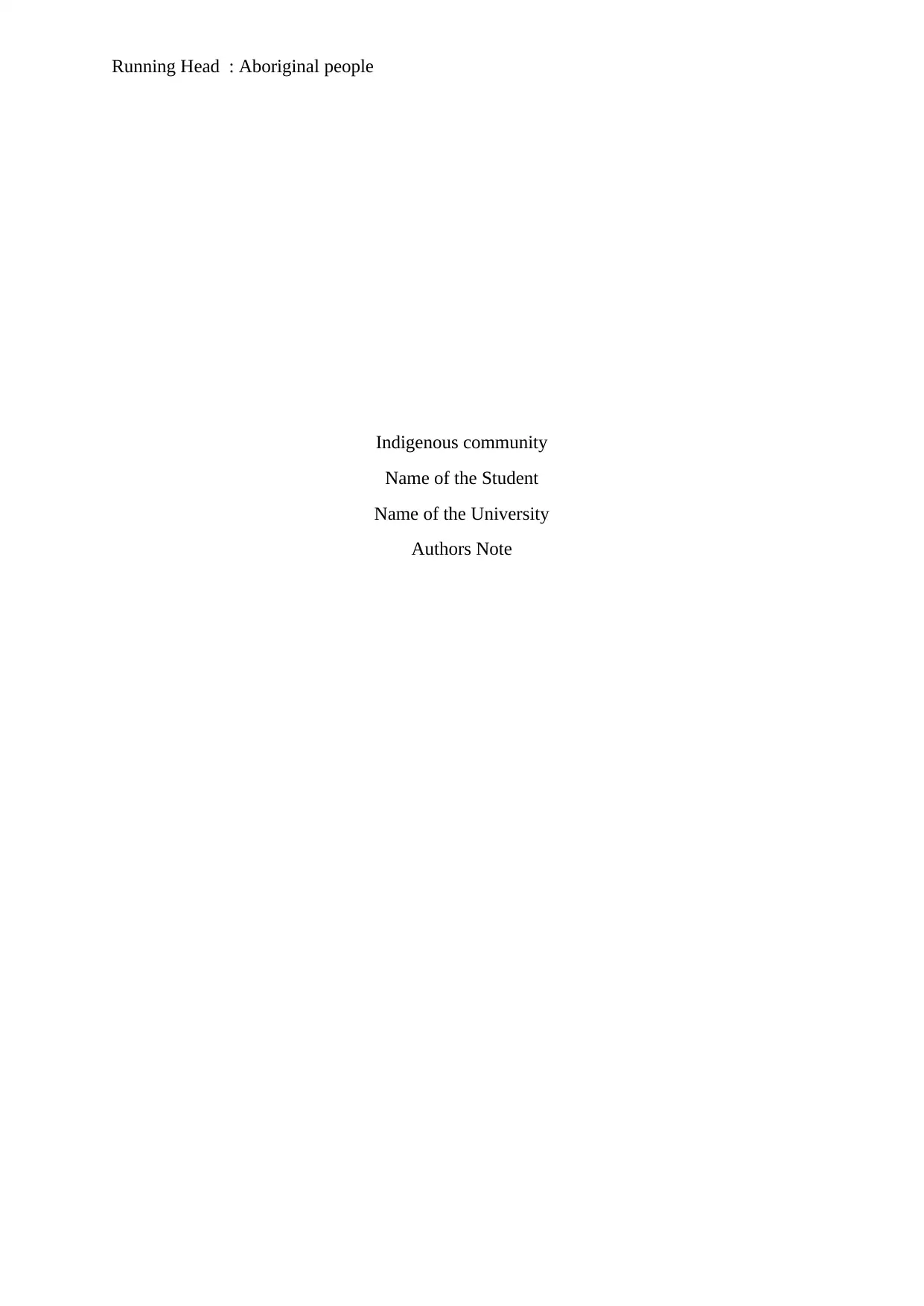
Running Head : Aboriginal people
Indigenous community
Name of the Student
Name of the University
Authors Note
Indigenous community
Name of the Student
Name of the University
Authors Note
Paraphrase This Document
Need a fresh take? Get an instant paraphrase of this document with our AI Paraphraser
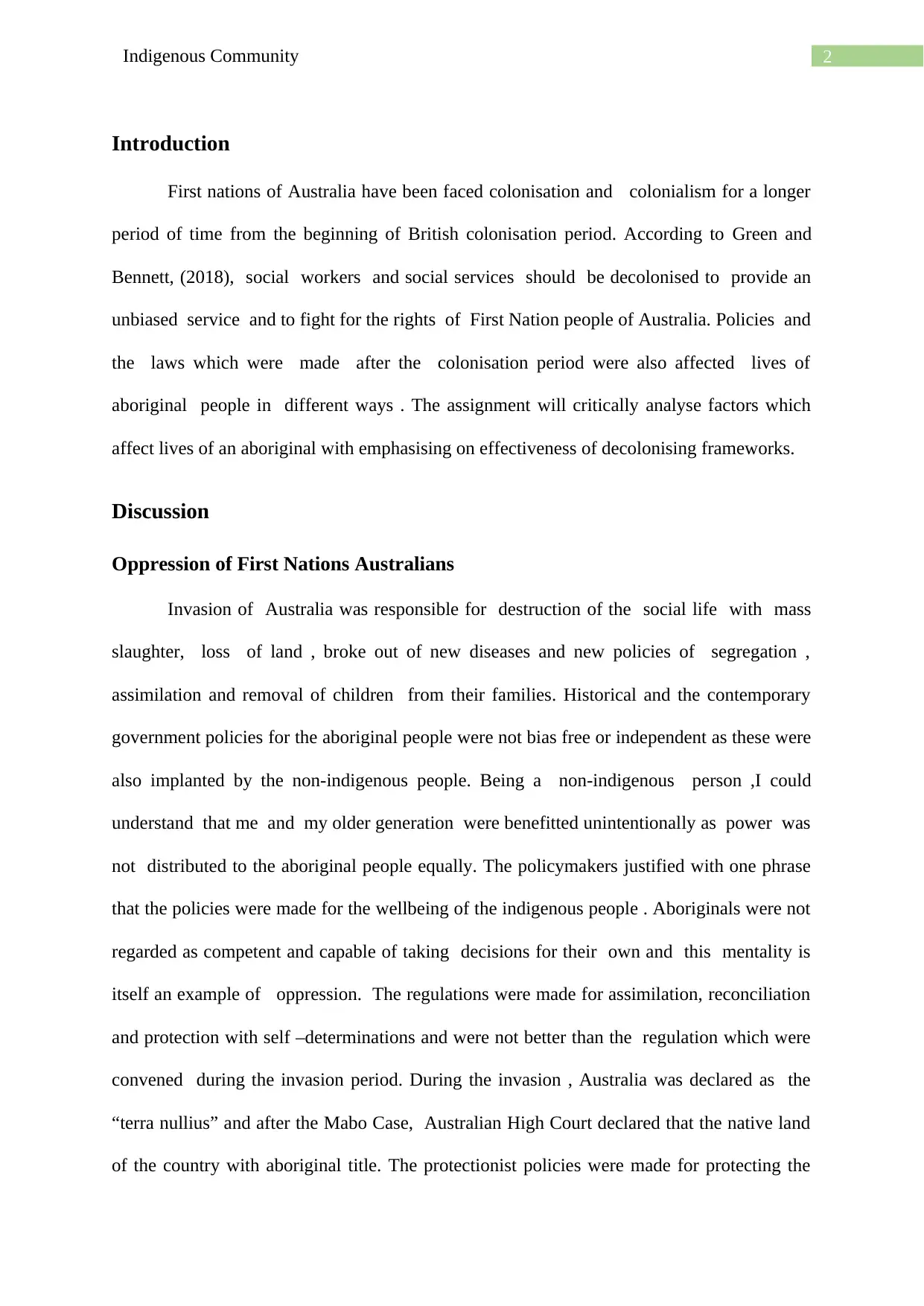
2Indigenous Community
Introduction
First nations of Australia have been faced colonisation and colonialism for a longer
period of time from the beginning of British colonisation period. According to Green and
Bennett, (2018), social workers and social services should be decolonised to provide an
unbiased service and to fight for the rights of First Nation people of Australia. Policies and
the laws which were made after the colonisation period were also affected lives of
aboriginal people in different ways . The assignment will critically analyse factors which
affect lives of an aboriginal with emphasising on effectiveness of decolonising frameworks.
Discussion
Oppression of First Nations Australians
Invasion of Australia was responsible for destruction of the social life with mass
slaughter, loss of land , broke out of new diseases and new policies of segregation ,
assimilation and removal of children from their families. Historical and the contemporary
government policies for the aboriginal people were not bias free or independent as these were
also implanted by the non-indigenous people. Being a non-indigenous person ,I could
understand that me and my older generation were benefitted unintentionally as power was
not distributed to the aboriginal people equally. The policymakers justified with one phrase
that the policies were made for the wellbeing of the indigenous people . Aboriginals were not
regarded as competent and capable of taking decisions for their own and this mentality is
itself an example of oppression. The regulations were made for assimilation, reconciliation
and protection with self –determinations and were not better than the regulation which were
convened during the invasion period. During the invasion , Australia was declared as the
“terra nullius” and after the Mabo Case, Australian High Court declared that the native land
of the country with aboriginal title. The protectionist policies were made for protecting the
Introduction
First nations of Australia have been faced colonisation and colonialism for a longer
period of time from the beginning of British colonisation period. According to Green and
Bennett, (2018), social workers and social services should be decolonised to provide an
unbiased service and to fight for the rights of First Nation people of Australia. Policies and
the laws which were made after the colonisation period were also affected lives of
aboriginal people in different ways . The assignment will critically analyse factors which
affect lives of an aboriginal with emphasising on effectiveness of decolonising frameworks.
Discussion
Oppression of First Nations Australians
Invasion of Australia was responsible for destruction of the social life with mass
slaughter, loss of land , broke out of new diseases and new policies of segregation ,
assimilation and removal of children from their families. Historical and the contemporary
government policies for the aboriginal people were not bias free or independent as these were
also implanted by the non-indigenous people. Being a non-indigenous person ,I could
understand that me and my older generation were benefitted unintentionally as power was
not distributed to the aboriginal people equally. The policymakers justified with one phrase
that the policies were made for the wellbeing of the indigenous people . Aboriginals were not
regarded as competent and capable of taking decisions for their own and this mentality is
itself an example of oppression. The regulations were made for assimilation, reconciliation
and protection with self –determinations and were not better than the regulation which were
convened during the invasion period. During the invasion , Australia was declared as the
“terra nullius” and after the Mabo Case, Australian High Court declared that the native land
of the country with aboriginal title. The protectionist policies were made for protecting the
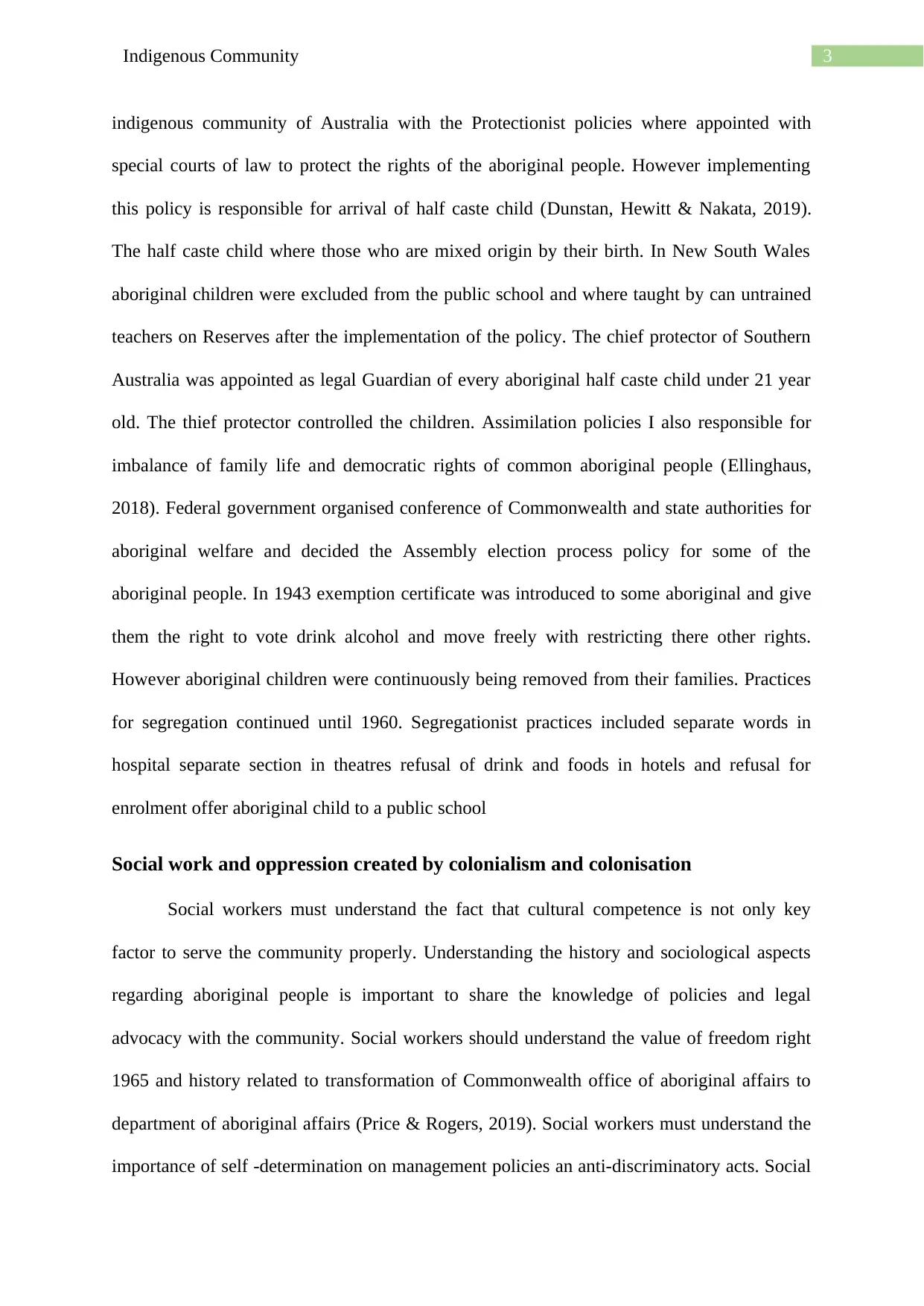
3Indigenous Community
indigenous community of Australia with the Protectionist policies where appointed with
special courts of law to protect the rights of the aboriginal people. However implementing
this policy is responsible for arrival of half caste child (Dunstan, Hewitt & Nakata, 2019).
The half caste child where those who are mixed origin by their birth. In New South Wales
aboriginal children were excluded from the public school and where taught by can untrained
teachers on Reserves after the implementation of the policy. The chief protector of Southern
Australia was appointed as legal Guardian of every aboriginal half caste child under 21 year
old. The thief protector controlled the children. Assimilation policies I also responsible for
imbalance of family life and democratic rights of common aboriginal people (Ellinghaus,
2018). Federal government organised conference of Commonwealth and state authorities for
aboriginal welfare and decided the Assembly election process policy for some of the
aboriginal people. In 1943 exemption certificate was introduced to some aboriginal and give
them the right to vote drink alcohol and move freely with restricting there other rights.
However aboriginal children were continuously being removed from their families. Practices
for segregation continued until 1960. Segregationist practices included separate words in
hospital separate section in theatres refusal of drink and foods in hotels and refusal for
enrolment offer aboriginal child to a public school
Social work and oppression created by colonialism and colonisation
Social workers must understand the fact that cultural competence is not only key
factor to serve the community properly. Understanding the history and sociological aspects
regarding aboriginal people is important to share the knowledge of policies and legal
advocacy with the community. Social workers should understand the value of freedom right
1965 and history related to transformation of Commonwealth office of aboriginal affairs to
department of aboriginal affairs (Price & Rogers, 2019). Social workers must understand the
importance of self -determination on management policies an anti-discriminatory acts. Social
indigenous community of Australia with the Protectionist policies where appointed with
special courts of law to protect the rights of the aboriginal people. However implementing
this policy is responsible for arrival of half caste child (Dunstan, Hewitt & Nakata, 2019).
The half caste child where those who are mixed origin by their birth. In New South Wales
aboriginal children were excluded from the public school and where taught by can untrained
teachers on Reserves after the implementation of the policy. The chief protector of Southern
Australia was appointed as legal Guardian of every aboriginal half caste child under 21 year
old. The thief protector controlled the children. Assimilation policies I also responsible for
imbalance of family life and democratic rights of common aboriginal people (Ellinghaus,
2018). Federal government organised conference of Commonwealth and state authorities for
aboriginal welfare and decided the Assembly election process policy for some of the
aboriginal people. In 1943 exemption certificate was introduced to some aboriginal and give
them the right to vote drink alcohol and move freely with restricting there other rights.
However aboriginal children were continuously being removed from their families. Practices
for segregation continued until 1960. Segregationist practices included separate words in
hospital separate section in theatres refusal of drink and foods in hotels and refusal for
enrolment offer aboriginal child to a public school
Social work and oppression created by colonialism and colonisation
Social workers must understand the fact that cultural competence is not only key
factor to serve the community properly. Understanding the history and sociological aspects
regarding aboriginal people is important to share the knowledge of policies and legal
advocacy with the community. Social workers should understand the value of freedom right
1965 and history related to transformation of Commonwealth office of aboriginal affairs to
department of aboriginal affairs (Price & Rogers, 2019). Social workers must understand the
importance of self -determination on management policies an anti-discriminatory acts. Social
⊘ This is a preview!⊘
Do you want full access?
Subscribe today to unlock all pages.

Trusted by 1+ million students worldwide
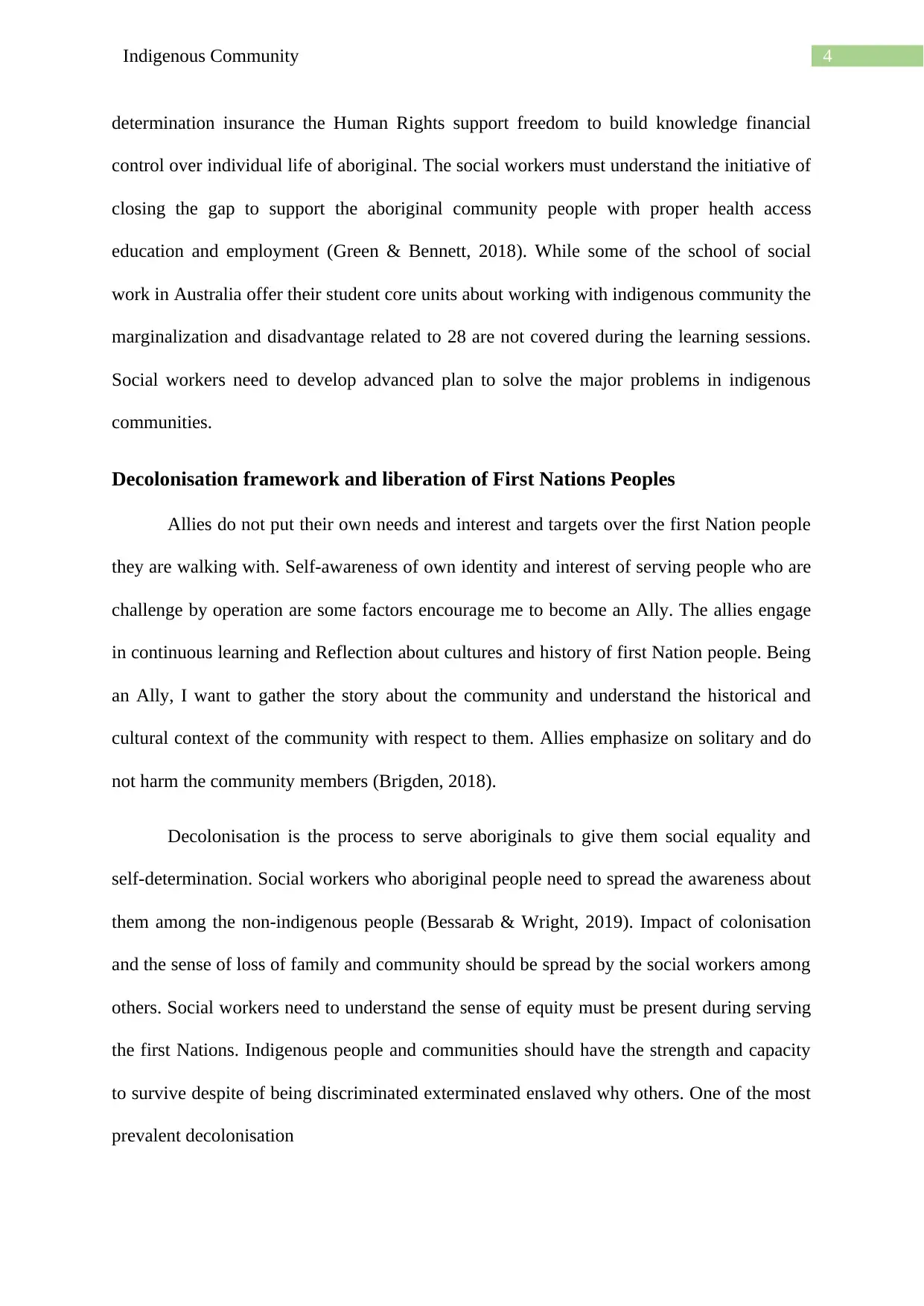
4Indigenous Community
determination insurance the Human Rights support freedom to build knowledge financial
control over individual life of aboriginal. The social workers must understand the initiative of
closing the gap to support the aboriginal community people with proper health access
education and employment (Green & Bennett, 2018). While some of the school of social
work in Australia offer their student core units about working with indigenous community the
marginalization and disadvantage related to 28 are not covered during the learning sessions.
Social workers need to develop advanced plan to solve the major problems in indigenous
communities.
Decolonisation framework and liberation of First Nations Peoples
Allies do not put their own needs and interest and targets over the first Nation people
they are walking with. Self-awareness of own identity and interest of serving people who are
challenge by operation are some factors encourage me to become an Ally. The allies engage
in continuous learning and Reflection about cultures and history of first Nation people. Being
an Ally, I want to gather the story about the community and understand the historical and
cultural context of the community with respect to them. Allies emphasize on solitary and do
not harm the community members (Brigden, 2018).
Decolonisation is the process to serve aboriginals to give them social equality and
self-determination. Social workers who aboriginal people need to spread the awareness about
them among the non-indigenous people (Bessarab & Wright, 2019). Impact of colonisation
and the sense of loss of family and community should be spread by the social workers among
others. Social workers need to understand the sense of equity must be present during serving
the first Nations. Indigenous people and communities should have the strength and capacity
to survive despite of being discriminated exterminated enslaved why others. One of the most
prevalent decolonisation
determination insurance the Human Rights support freedom to build knowledge financial
control over individual life of aboriginal. The social workers must understand the initiative of
closing the gap to support the aboriginal community people with proper health access
education and employment (Green & Bennett, 2018). While some of the school of social
work in Australia offer their student core units about working with indigenous community the
marginalization and disadvantage related to 28 are not covered during the learning sessions.
Social workers need to develop advanced plan to solve the major problems in indigenous
communities.
Decolonisation framework and liberation of First Nations Peoples
Allies do not put their own needs and interest and targets over the first Nation people
they are walking with. Self-awareness of own identity and interest of serving people who are
challenge by operation are some factors encourage me to become an Ally. The allies engage
in continuous learning and Reflection about cultures and history of first Nation people. Being
an Ally, I want to gather the story about the community and understand the historical and
cultural context of the community with respect to them. Allies emphasize on solitary and do
not harm the community members (Brigden, 2018).
Decolonisation is the process to serve aboriginals to give them social equality and
self-determination. Social workers who aboriginal people need to spread the awareness about
them among the non-indigenous people (Bessarab & Wright, 2019). Impact of colonisation
and the sense of loss of family and community should be spread by the social workers among
others. Social workers need to understand the sense of equity must be present during serving
the first Nations. Indigenous people and communities should have the strength and capacity
to survive despite of being discriminated exterminated enslaved why others. One of the most
prevalent decolonisation
Paraphrase This Document
Need a fresh take? Get an instant paraphrase of this document with our AI Paraphraser
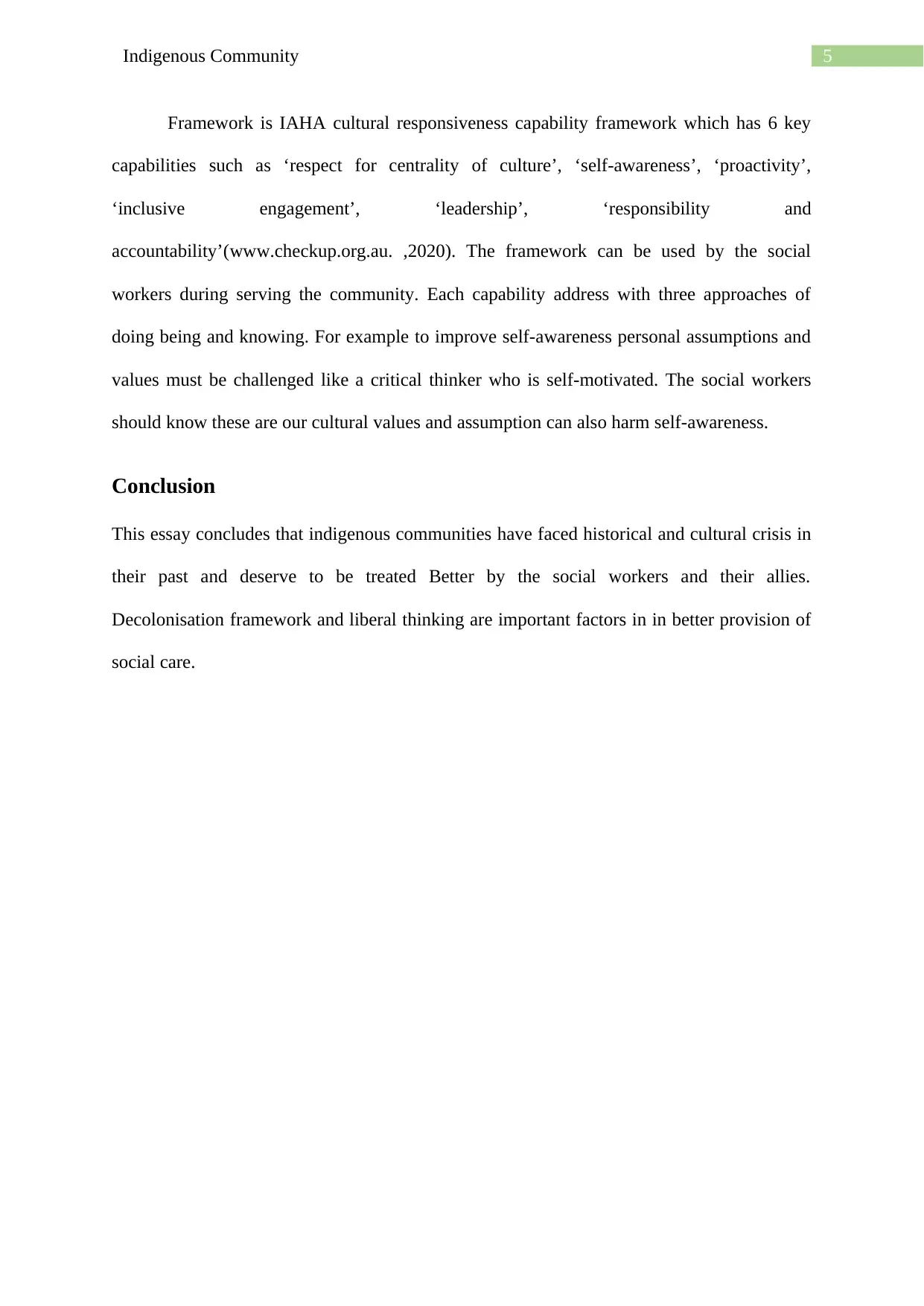
5Indigenous Community
Framework is IAHA cultural responsiveness capability framework which has 6 key
capabilities such as ‘respect for centrality of culture’, ‘self-awareness’, ‘proactivity’,
‘inclusive engagement’, ‘leadership’, ‘responsibility and
accountability’(www.checkup.org.au. ,2020). The framework can be used by the social
workers during serving the community. Each capability address with three approaches of
doing being and knowing. For example to improve self-awareness personal assumptions and
values must be challenged like a critical thinker who is self-motivated. The social workers
should know these are our cultural values and assumption can also harm self-awareness.
Conclusion
This essay concludes that indigenous communities have faced historical and cultural crisis in
their past and deserve to be treated Better by the social workers and their allies.
Decolonisation framework and liberal thinking are important factors in in better provision of
social care.
Framework is IAHA cultural responsiveness capability framework which has 6 key
capabilities such as ‘respect for centrality of culture’, ‘self-awareness’, ‘proactivity’,
‘inclusive engagement’, ‘leadership’, ‘responsibility and
accountability’(www.checkup.org.au. ,2020). The framework can be used by the social
workers during serving the community. Each capability address with three approaches of
doing being and knowing. For example to improve self-awareness personal assumptions and
values must be challenged like a critical thinker who is self-motivated. The social workers
should know these are our cultural values and assumption can also harm self-awareness.
Conclusion
This essay concludes that indigenous communities have faced historical and cultural crisis in
their past and deserve to be treated Better by the social workers and their allies.
Decolonisation framework and liberal thinking are important factors in in better provision of
social care.
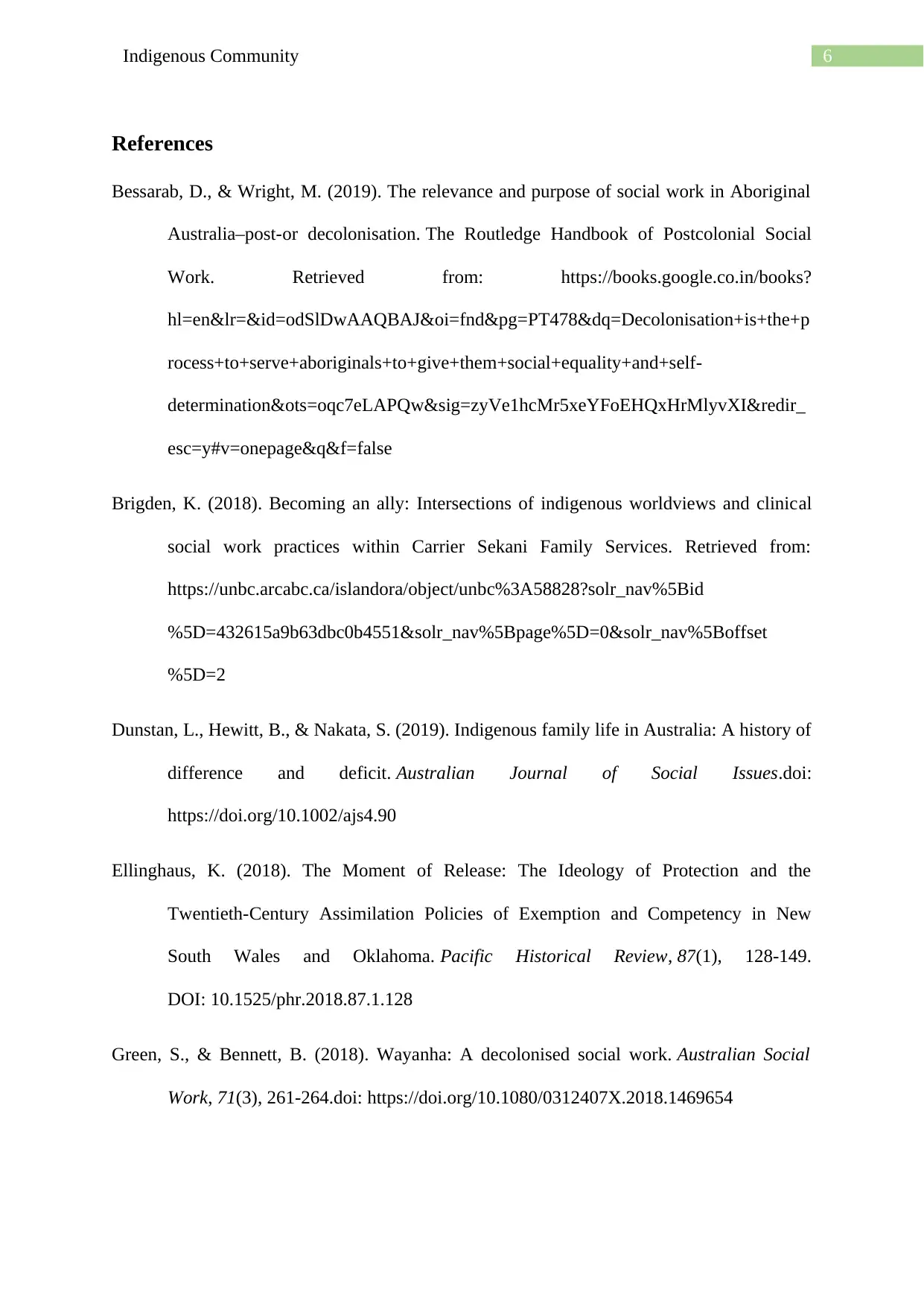
6Indigenous Community
References
Bessarab, D., & Wright, M. (2019). The relevance and purpose of social work in Aboriginal
Australia–post-or decolonisation. The Routledge Handbook of Postcolonial Social
Work. Retrieved from: https://books.google.co.in/books?
hl=en&lr=&id=odSlDwAAQBAJ&oi=fnd&pg=PT478&dq=Decolonisation+is+the+p
rocess+to+serve+aboriginals+to+give+them+social+equality+and+self-
determination&ots=oqc7eLAPQw&sig=zyVe1hcMr5xeYFoEHQxHrMlyvXI&redir_
esc=y#v=onepage&q&f=false
Brigden, K. (2018). Becoming an ally: Intersections of indigenous worldviews and clinical
social work practices within Carrier Sekani Family Services. Retrieved from:
https://unbc.arcabc.ca/islandora/object/unbc%3A58828?solr_nav%5Bid
%5D=432615a9b63dbc0b4551&solr_nav%5Bpage%5D=0&solr_nav%5Boffset
%5D=2
Dunstan, L., Hewitt, B., & Nakata, S. (2019). Indigenous family life in Australia: A history of
difference and deficit. Australian Journal of Social Issues.doi:
https://doi.org/10.1002/ajs4.90
Ellinghaus, K. (2018). The Moment of Release: The Ideology of Protection and the
Twentieth-Century Assimilation Policies of Exemption and Competency in New
South Wales and Oklahoma. Pacific Historical Review, 87(1), 128-149.
DOI: 10.1525/phr.2018.87.1.128
Green, S., & Bennett, B. (2018). Wayanha: A decolonised social work. Australian Social
Work, 71(3), 261-264.doi: https://doi.org/10.1080/0312407X.2018.1469654
References
Bessarab, D., & Wright, M. (2019). The relevance and purpose of social work in Aboriginal
Australia–post-or decolonisation. The Routledge Handbook of Postcolonial Social
Work. Retrieved from: https://books.google.co.in/books?
hl=en&lr=&id=odSlDwAAQBAJ&oi=fnd&pg=PT478&dq=Decolonisation+is+the+p
rocess+to+serve+aboriginals+to+give+them+social+equality+and+self-
determination&ots=oqc7eLAPQw&sig=zyVe1hcMr5xeYFoEHQxHrMlyvXI&redir_
esc=y#v=onepage&q&f=false
Brigden, K. (2018). Becoming an ally: Intersections of indigenous worldviews and clinical
social work practices within Carrier Sekani Family Services. Retrieved from:
https://unbc.arcabc.ca/islandora/object/unbc%3A58828?solr_nav%5Bid
%5D=432615a9b63dbc0b4551&solr_nav%5Bpage%5D=0&solr_nav%5Boffset
%5D=2
Dunstan, L., Hewitt, B., & Nakata, S. (2019). Indigenous family life in Australia: A history of
difference and deficit. Australian Journal of Social Issues.doi:
https://doi.org/10.1002/ajs4.90
Ellinghaus, K. (2018). The Moment of Release: The Ideology of Protection and the
Twentieth-Century Assimilation Policies of Exemption and Competency in New
South Wales and Oklahoma. Pacific Historical Review, 87(1), 128-149.
DOI: 10.1525/phr.2018.87.1.128
Green, S., & Bennett, B. (2018). Wayanha: A decolonised social work. Australian Social
Work, 71(3), 261-264.doi: https://doi.org/10.1080/0312407X.2018.1469654
⊘ This is a preview!⊘
Do you want full access?
Subscribe today to unlock all pages.

Trusted by 1+ million students worldwide
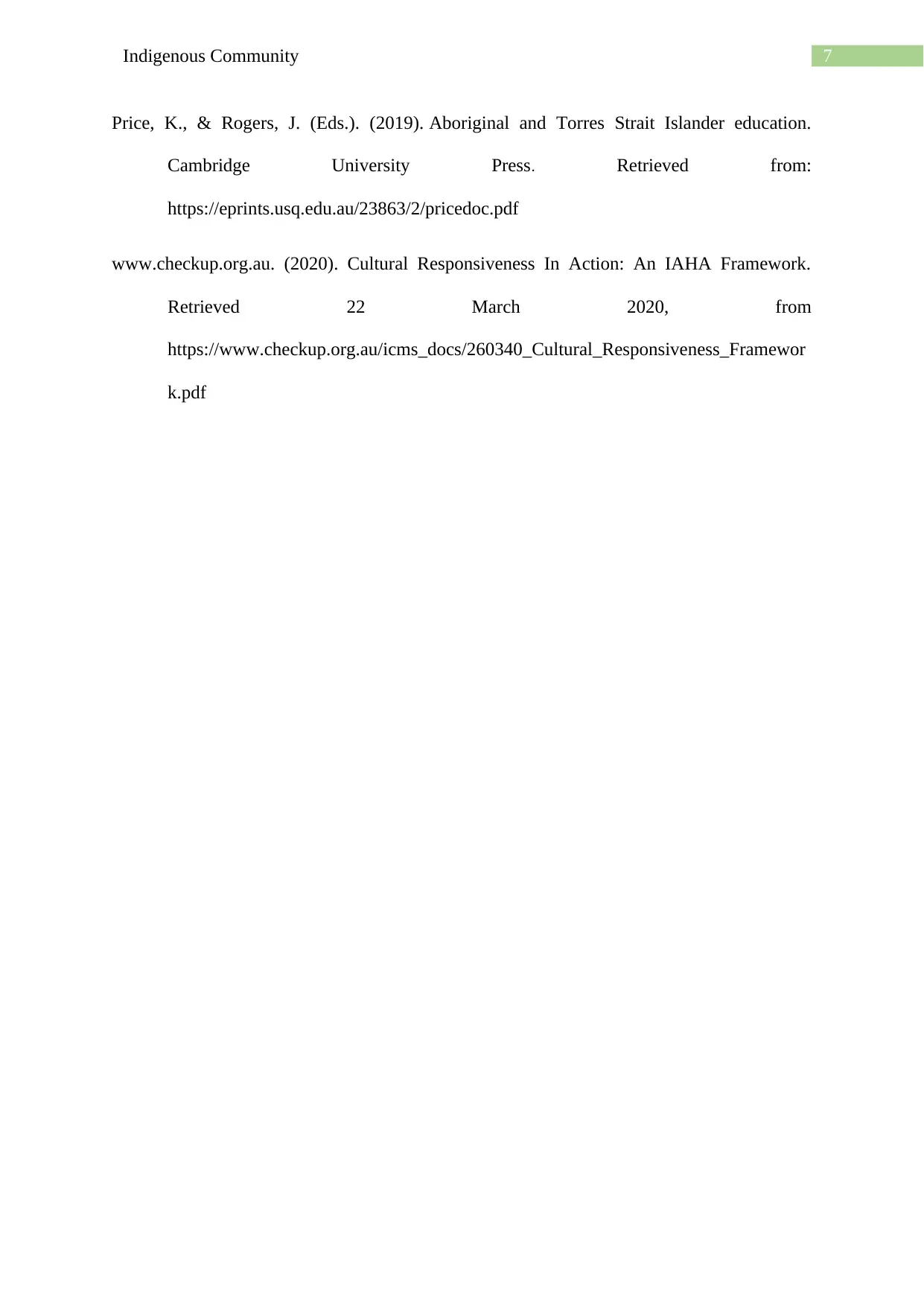
7Indigenous Community
Price, K., & Rogers, J. (Eds.). (2019). Aboriginal and Torres Strait Islander education.
Cambridge University Press. Retrieved from:
https://eprints.usq.edu.au/23863/2/pricedoc.pdf
www.checkup.org.au. (2020). Cultural Responsiveness In Action: An IAHA Framework.
Retrieved 22 March 2020, from
https://www.checkup.org.au/icms_docs/260340_Cultural_Responsiveness_Framewor
k.pdf
Price, K., & Rogers, J. (Eds.). (2019). Aboriginal and Torres Strait Islander education.
Cambridge University Press. Retrieved from:
https://eprints.usq.edu.au/23863/2/pricedoc.pdf
www.checkup.org.au. (2020). Cultural Responsiveness In Action: An IAHA Framework.
Retrieved 22 March 2020, from
https://www.checkup.org.au/icms_docs/260340_Cultural_Responsiveness_Framewor
k.pdf
1 out of 7
Related Documents
Your All-in-One AI-Powered Toolkit for Academic Success.
+13062052269
info@desklib.com
Available 24*7 on WhatsApp / Email
![[object Object]](/_next/static/media/star-bottom.7253800d.svg)
Unlock your academic potential
Copyright © 2020–2025 A2Z Services. All Rights Reserved. Developed and managed by ZUCOL.





